|
Airfix 1/48 Junkers Ju
87R-2
Italian Stuka - Picchiatello
by Vince Tassone
|
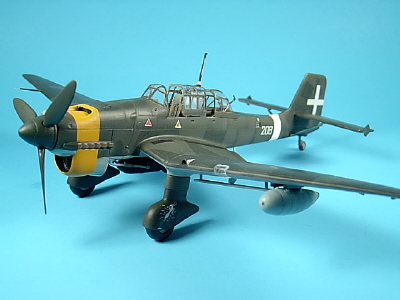 |
|
Junkers Ju 87R-2 Stuka |

HyperScale is proudly supported by Squadron.com
In its brief but spectacular career the dive bomber has earned itself
a unique place in the pages of aeronautical history. However no other
aircraft has typified the terror wrought by these aircraft as did the
Ju87 Stuka.
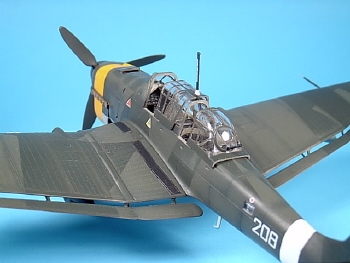 Perhaps
understanding early the limitations of the dive bomber, the Regia
Aeronautica (RA) never fully committed itself to the development of the
dive bomber, choosing instead to devote its resources to the development
of conventional ground attack aircraft and strategic bombers such as the
Piaggio P.108, Cant. 1007 and Cant.1018. However, with the rapid German
successes in France and Poland and seeing a need for the pinpoint
accuracy of the dive bomber in place of level bombing (in support of its
navy), the Regia Aeronautica turned to the Ju87. It is interesting to
note that neither Britain, France or Russia developed a successful dive
bomber while the US, Japan and Germany each featured one. However the
Ju87 stands alone as the only successful land based dive bomber. Perhaps
understanding early the limitations of the dive bomber, the Regia
Aeronautica (RA) never fully committed itself to the development of the
dive bomber, choosing instead to devote its resources to the development
of conventional ground attack aircraft and strategic bombers such as the
Piaggio P.108, Cant. 1007 and Cant.1018. However, with the rapid German
successes in France and Poland and seeing a need for the pinpoint
accuracy of the dive bomber in place of level bombing (in support of its
navy), the Regia Aeronautica turned to the Ju87. It is interesting to
note that neither Britain, France or Russia developed a successful dive
bomber while the US, Japan and Germany each featured one. However the
Ju87 stands alone as the only successful land based dive bomber.
No other country outside of Germany has gained as much notoriety in the
use of this aircraft as did the Italians. Seeing that the number of Ju
87s avaiable could not reach the prescribed numbers needed to put into
effect the tactics of the Luftwaffe, the Italians developed the skip
bombing technique well before its use in the Pacific war. Italian dive
bomber groups were called Bombardamento di Picchiata (Dive Bomber Group)
and hence Picchatello (Dive Bomber).
This is the considerately underrated 1/48 scale Airfrix Ju87 B2/R
kit. I first purchased the kit at a very economical price some time ago
and after opening the kit I placed it on my shelf since my first
impressions of the kit were rather negative. The kit sprues are molded
in light grey plastic with some amount of flashing and the canopy is
framed as two parts only. The wings and fuselage are finished with
rasied detail and rivets. Not long ago I stumbled upon the True Details
photo etched cockpit set and in the spirit of resurrecting an unwanted
kit I decided to give it a try.
Surprisingly the Airfix 1/48 Ju87B kit is geometrically equivalent to
the modern Hasegawa offering. I began construction as others do with the
cockpit interior. The side walls of the cockpit are sufficiently
detailed and framed.
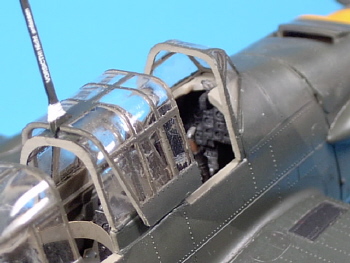 The
True Details instrument panel is well done with excellent detail however
the instrument panel sits far too deep inside the cockpit and is
difficult to see. The detail set also provides a nice ammunition box, a
rear gunners seat, the rear gunners back strap as well as an armoured
overturn structure and details for a radio set. Gunsights are provided
for the pilot and rear gunner machine gun. The
True Details instrument panel is well done with excellent detail however
the instrument panel sits far too deep inside the cockpit and is
difficult to see. The detail set also provides a nice ammunition box, a
rear gunners seat, the rear gunners back strap as well as an armoured
overturn structure and details for a radio set. Gunsights are provided
for the pilot and rear gunner machine gun.
After completing the cockpit pit interior I carefully separated the
canopy into 4 parts and added a ¼" notch to the end of the pilots
sliding canopy for the radio antenna. The canopy is injected molded and
a little thick but clear.
Next I assembled the wings which need to be assembled and glued to
the fuselage as one piece. Filling was needed between the undersides of
the fuselage and wing area. The elevators and rear struts were simple to
assemble and attach. The wing flaps come as separate attachments and
require a little care when handling the model.
A bonus compared to the Hasegawa kit are the separate actuator flaps
that attach to the wing, however I replaced the kit actuators with ones
made of copper wire.
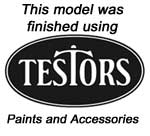 I
chose to model the R-2 (Reichweite) long range version used by the 208a
Sq., 101o Gruppo operating from Tirana, Albania in March 1941. I used
the decals from the Hasegawa kit since I ordered an extra set from Eagle
Strike Decals for Giuseppe Cenni's plane (a future project). I
chose to model the R-2 (Reichweite) long range version used by the 208a
Sq., 101o Gruppo operating from Tirana, Albania in March 1941. I used
the decals from the Hasegawa kit since I ordered an extra set from Eagle
Strike Decals for Giuseppe Cenni's plane (a future project).
As with all Hasegawa decals, care must be taken when using setting
solution since the decals are thin. The kit was finished in the standard
RLM 70/71 splinter pattern for upper surfaces and RLM 65 for the
undersides. RLM 02 was used for the cockpit interior and Verde Oliva
Scuro FS 34052 was used to overpaint the German Balkankreutzen and
swastika on the upper wing surfaces and rudder.
Polly Scale paints were used for all paints.
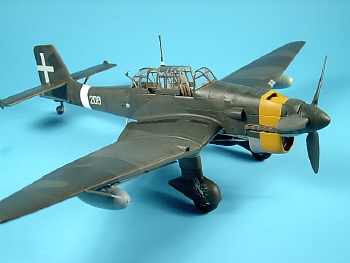 As
you can see from the pics, the completed model looks attractive. I think
the Ju87 in RA colors looks far better than the German schemes. As
you can see from the pics, the completed model looks attractive. I think
the Ju87 in RA colors looks far better than the German schemes.
As an added note, I deceided not to remove the raised rivets since
the effect of the rivets was subtle and indeed the raised detail added
to the overall appearance of the model. I think the Airfix kit
represents a high point in the development of the 'old-style' kits and
shows that when properly done, raised detail has as much of a dramatic
effect on the overall appearance of a model as does recessed panel
lines.
Highly recommended.
|
Home
| What's New |
Features |
Gallery |
Reviews |
Reference |
Forum |
Search